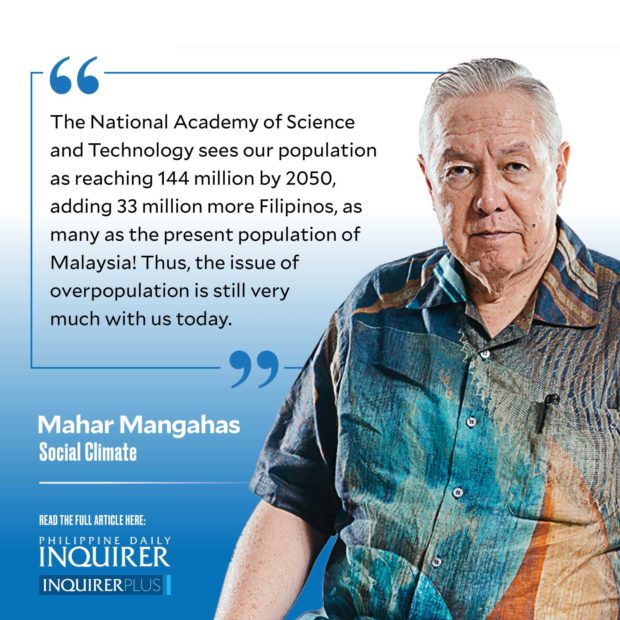Scientists look toward 2050
The theme of last week’s annual scientific meeting of the National Academy of Science and Technology (NAST) was Pagtanaw 2050: Agham tungo sa mabuting kinabukasan (Foresight 2050: Science for a sustainable future).
Pagtanaw 2050 is NAST’s venture into “foresight planning,” the new jargon for looking at least 30 years ahead. Its subtitle, “Towards a Prosperous, Archipelagic, Maritime Nation,” emphasizes that the Philippines’ exclusive economic zone or EEZ (reaching 200 nautical miles from its shores) covers 2.26 million square kilometers of sea, or over seven times its 300,000 square kilometers of land area, including inland waters (see my column, “Archipelagic and maritime,” 11/27/21).
The precursor of Pagtanaw. “Perspective planning” is an older term that meant looking toward 2000, which is already yesteryear for many. It was apt for the precursor 1975-77 study, “Population, Resources, Environment and the Philippine Future (PREPF),” done by the Development Academy of the Philippines (DAP), the UP School of Economics (UPSE), and the UP Population Institute (UPPI), and condensed in the book “Probing Our Futures” (1980). In PREPF, I directed the DAP and UPSE portions, while National Scientist Mercedes Concepcion directed the UPPI portion. NAST was then in the process of being established (1976).
PREPF was mainly worried about our galloping population, which it warned was liable to grow from 45 to 75 million over 1975-2000, which actually happened, more or less. In 1975 the populations of the Philippines, Thailand, and Vietnam were roughly equal; now Filipinos (111 million) far outnumber Vietnamese (98 million) and Thais (70 million).
NAST’s Pagtanaw sees our population as reaching 144 million by 2050, adding 33 million more Filipinos, as many as the present population of Malaysia! Thus, the issue of overpopulation is still very much with us today.
Pagtanaw 2050 says little about dampening population growth, perhaps in awe of the immense geographical scope of the Philippines on the surface of the globe. Rather, it prescribes: “the protection of our maritime resources, with all the scientific, technological, legal, and social weapons we can muster. We need a stronger navy, plus alliances with naval powers. We need satellites in the sky, to watch over our far-flung EEZs. We need marine biologists and marine geologists. We need investments in seaports and shipbuilding more than in roads and land transportation. We already have the world’s largest seagoing workforce; we need to improve in terms of quality rather than quantity” (from my 11/27/21 column).
What about the COVID-19 pandemic and the inflation in cost of living? The Pagtanaw 2050 study was conceived in 2018, before the pandemic struck; it was completed in 2021, and surely did not anticipate Putin’s war in Ukraine and the current inflation, not to mention the results of the May 2022 election. How should all these be factored in?
In his introduction to the PREPF book, political scientist O. D. Corpuz wrote: “We can cope with austerity, only by developing certain national values. First of these is self-reliance. Self-reliance as a value is necessary to remove the unrealistic notion that the totality of well-being is a claim of people upon or against their government…
“During a period of austerity for many of your people, you cannot really ask the latter to bear with it all, and on top of it to support government, unless you provide for their participation. Second, therefore, the value of participatory democracy must be fostered and institutionalized during the austerity generation. … Participation in the political system is not really a selfish claim, like a right to a piece of apple pie; participation in a democracy is a role for all, certainly an obligation for all who have reached the age of reason…
“If participation is not positively accommodated and provided for, the people will sooner or later demand a share in the management of their austerity, and you get a lot of leaders this way who think of class or sectoral interests instead of thinking of the national community’s welfare” (“Probing Our Futures,” pages 9 and 10).
To get where you want to go, remember where you came from.
——————
Contact: mahar.mangahas@sws.org.ph





















